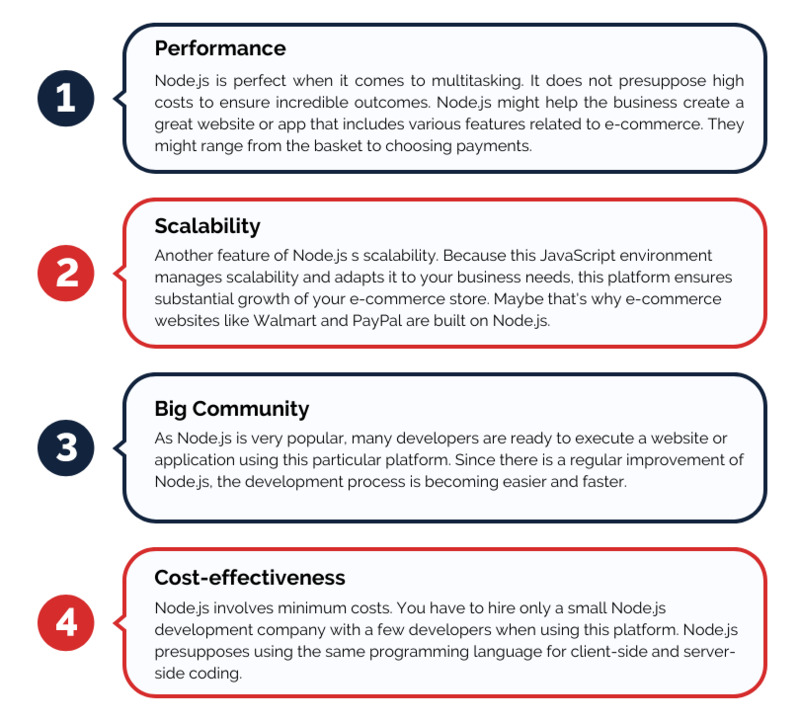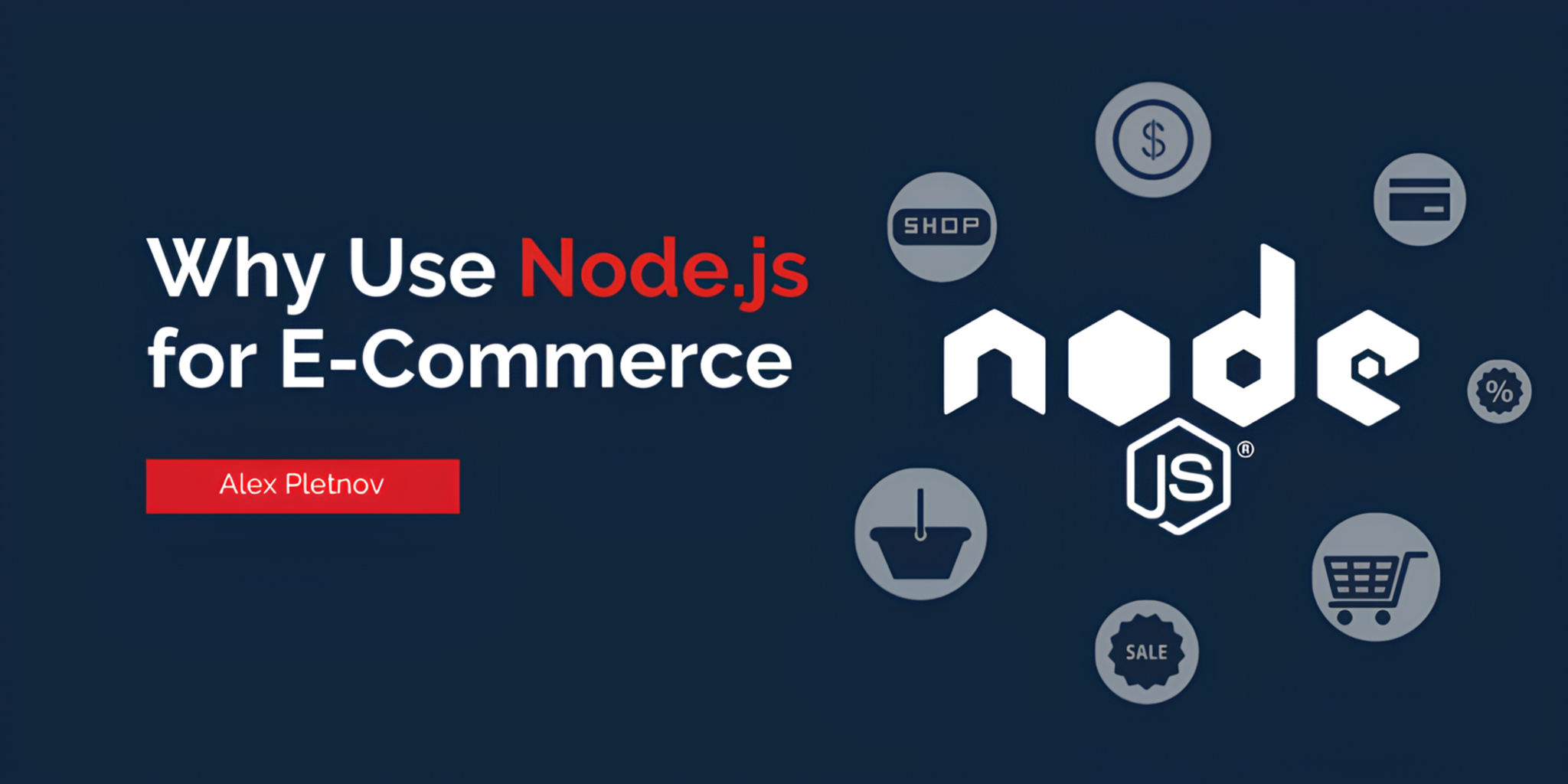Check out the main reasons for building an e-commerce website using Node.js in detail
The modern world is characterized by a range of businesses. However, the main feature of almost all types of companies is digitalization. These days, digitalization helps increase sales, brand value, and even more. Businesses attempt to opt for e-commerce to involve clients from different parts of the world. The reason for this is that almost everyone does online shopping. It is not only convenient but also helps save time. So, the e-commerce industry is bound to grow even more soon. Realizing this tendency, businesses opt for Node.js e-commerce to take advantage of this environment.
Yet, there are many e-commerce websites, and thus, it might be difficult for businesses to outperform them. However, if they choose the proper framework, they might make their website stand out and attract more customers. This is why a growing number of websites related to e-commerce are built on Node.js.
Node.js, without a doubt, is widely used by developers worldwide. An increasing number of users choose Node.js since this open-source server environment has several benefits. With the help of the given JavaScript environment, you can build performant and scalable applications. That is why the number of developers who prefer using Node.js increases each year. So is e-commerce using the Node.js framework a good option? Let’s find out together.
What is Node.js?
Firstly, let’s determine the essence of Node.js. So, Node.js is an open-source Javascript environment utilized for non-blocking, event-driven servers. As freeCodeCamp points out, the formal definition of Node.js sounds the following way:
Node.js is a JavaScript runtime built on Chrome’s V8 JavaScript engine.
Node.js offers scalable apps that have a great source of JavaScript library modules. In addition, it helps build applications more efficiently for the Web 2.0 era since this framework makes event-based, non-blocking I/O-heavy applications.
What is E-commerce?
E-commerce is believed to be a complex system that requires reliable technology to ensure that all pieces work together. Over the last couple of years, e-commerce has become an important business strategy. This platform can offer customers plenty of options at realistic prices. In addition, e-commerce is an excellent way of handling your sales since it is open 24 hours a day.

Maybe that is why e-commerce websites and mobile apps sometimes have an advantage over offline stores. As the research indicates, there are more than 7,50,000 e-commerce companies worldwide up to this day. This figure is impressive, and the growth of e-commerce stores might suggest that it might even increase with time.
E-commerce Challenges
Further research published some other data about the growth of e-commerce in the future. In particular, Meticulous Research identified that “the global e-commerce market is expected to grow at a CAGR of 11.1% from 2018 to 2025 to reach $24,265.12 billion by 2025.” Thus, it is evident that those businesses would also have to think about the right technologies to choose from while executing the website or app, which would be attractive to customers.
Here are the two most common challenges in e-commerce
Customers’ Exploding Expectations
Retailers worldwide intend to create a sharp brand image that would eventually offer an excellent experience for customers. These days, customer experience matters the most. Yet, many businesses fail to meet customer expectations. They simply cannot create the same customer experience, just like some mighty tech giants like Amazon.
Personalization Approach
Customer experience is also strongly associated with personalization. However, at the same time, it is necessary to ensure that you do not create an over-personalized experience. The excessive amount of online ads might irritate customers. This way, businesses may fail to develop positive relationships with their customers and make them feel not valued.
Choosing to build an e-commerce website might be a good strategy, though selecting the right technology may be one of the most critical decisions. This article will convince you to consider using theNode.js e-commerce platform.
Node.js E-сommerce – 4 Reasons to Use Node.js for E-сommerce
As mentioned above, Node.js is the best platform for many reasons. This primarily refers to e-commerce websites and apps. Why? Primarily because Node.js works for both backend and frontend coding. In addition, this framework can be used for online endeavors and content administration.
On the whole, Node.js lets you develop scalable applications. For example, Node.js might be a perfect match for chats, streaming mobile applications, and other apps. Now, let’s consider the main reasons why Node.js is suitable for e-commerce.
Performance
Node.js is perfect when it comes to multitasking. Unlike other platforms, this JavaScript environment does not presuppose high costs to ensure incredible outcomes. For example, Node.js might help the business create a great website or app that includes various features related to e-commerce. To be precise, they might range from the basket to choosing payments. Developers responsible for ensuring practical and attractive e-commerce websites have to choose the technology that correctly serves such tasks. In this case, Node.js is a perfect choice. Since Node.js can deal with different operations simultaneously, this platform has proven ideal for e-commerce development.
Scalability
Another feature of Node.js which helps to outperform other platforms is scalability. Because this JavaScript environment manages scalability and adapts it to your business needs, this platform ensures substantial growth of your e-commerce store. Maybe that’s why e-commerce websites like Walmart and PayPal are built on Node.js.
Big Community
As Node.js is very popular, many developers are ready to execute a website or application using this particular platform. Since there is a regular improvement of Node.js, the development process is becoming easier and faster. Besides, if you need any assistance in creating e-commerce using Node.js, you can always get in touch with us, and together we might make an attractive e-commerce store.
Cost-effectiveness
Wonder what might be another benefit of Node.js apart from scalability and availability of a massive number of Node.js developers? By allowing e-commerce websites and apps to release updates swiftly, Node.js also involves minimum costs. You have to hire only a small Node.js development company with a few developers when using this platform. This is because this platform presupposes using the same programming language for client-side and server-side coding. That is why you developers can alter their roles and thus help you save a lot of money. In other words, such an approach to creating an e-commerce website or application is considered very affordable.

Negatives of Node.js for Ecommerce Development
Problems with CPU-bound tasks
Node.js is usually celebrated for its efficiency in handling scalable network applications. However, it often falls short when it comes to CPU-intensive tasks. Ecommerce platforms, which demand a swift and seamless user experience, may find this limitation a significant drawback. The architecture of Node.js operates on a single thread for concurrent request scenarios. As a result, it’s not optimized for tasks requiring heavy computation. This can lead to delays in processing. Ultimately, they may affect the overall performance of ecommerce apps. Such a bottleneck can be problematic for a project that needs a fast interface. The issue is especially crucial when processing large volumes of transactions. Handling complex algorithms for product recommendation systems is also a major problem.
Lower performance due to blocking I/O operations
One of the core features of Node.js from the standpoint of ecommerce business is its asynchronous programming model. It was designed to prevent I/O operations from blocking the main thread. However, in practice, if not implemented meticulously, I/O operations can still lead to performance degradation that disrupts customer engagement. This is especially critical for ecommerce apps. There, the page load and transaction speed directly influence user experience and sales. A single blocking operation may halt the processing of other requests. Consequently, a pile-up of pending tasks will occur. For sensitive customer information processing, this can mean delays and potential breaches. All these negative factors can impact trust in an ecommerce platform.
Limited database solutions
While Node.js supports a wide range of databases, its non-blocking nature and the asynchronous programming model may not align well with traditional relational databases necessary for an average ecommerce application. This limitation can compel developers to opt for NoSQL databases in Node.js ecommerce development, which might not always be the ideal choice for specific ecommerce project requirements. The mismatch between the tech stack may end in additional development overhead. Thus, it’s logical to expect complications in the integration of the ecommerce app with existing systems. Moreover, the presented pathway can potentially hinder your app’s ability to scale effectively and offer a responsive design, as you won’t be able to expand databases efficiently.
Crash recovery challenges
Node.js applications are vulnerable to crashes due to unhandled exceptions. This factor can be detrimental to ecommerce platforms, where high availability is crucial for maintaining customer trust. The single-threaded nature of Node.js means that an uncaught error can bring down the entire server. Such an issue will affect all users currently interacting with the ecommerce app. Implementing robust error handling and crash recovery mechanisms can be more challenging in Node.js compared to other technologies. This action will require additional effort from developers to ensure stability.
Long-term problems with security
The open-source nature of Node.js and its extensive package manager ecosystem also introduce security challenges. Vulnerabilities in third-party packages can expose ecommerce applications to risks such as cross-site scripting or data breaches. This problem is particularly concerning for platforms dealing with sensitive customer information. Despite the proactive efforts of the Node.js community to address security issues, the responsibility ultimately falls on the developers to ensure that their ecommerce apps are secure. This includes regular updates, vulnerability assessments, and adopting best practices in security. These actions add complexity to the development and maintenance of an ecommerce project.
Key Practices to Master Node.js in Ecommerce Settings
Avoid older prototypes (inheritance issues)
For efficient development in Node.js, especially for ecommerce website development, one thing an expert developer can recommend is steering clear of prototypal inheritance. This model can complicate the codebase. As a result, a community of developer groups will have trouble collaborating efficiently. Instead, adopting functional programming or simpler inheritance patterns can lead to more maintainable and scalable code for a custom ecommerce application. This approach streamlines the architecture, ensuring that the ecommerce software platform remains robust and easy to update.
Avoid non-standard code formats
Implementing standard code formats is crucial in ecommerce development. Tools like ESLint, when integrated into the development process, enforce consistency and prevent common errors. This practice not only enhances code quality but also fosters an environment where a community of developers can contribute more efficiently. Those standards ensure that the ecommerce platform’s codebase is accessible to all stakeholders.
Solve problems as fast as possible
Proactive error handling is fundamental in Node.js ecommerce development. By addressing errors promptly and implementing comprehensive logging, developers can ensure that the ecommerce platform remains reliable and user-friendly. This strategy minimizes downtime and maintains the trust of users. This is ultimately vital for the success of any ecommerce software platform. Effective error management also aids in identifying and resolving potential issues before they impact the end-user experience.
Create a unified style for UI development
When developing the UI for an ecommerce platform, adopting a universal style with tools and libraries such as React can greatly enhance the user experience. This practice ensures that the designs are consistent across different parts of the application. Such an approach is crucial for creating a cohesive and intuitive user interface. Utilizing React for UI development in Node.js projects allows for the creation of a responsive and dynamic ecommerce application. Why? You can leverage its component-based architecture to build reusable UI elements that can accelerate the development process.
4 Steps on How to Build an E-commerce Site with Node.js
Apart from why Node.js should be used in e-commerce, there is a specific approach to building the e-commerce website with Node.js.
Step 1. Analysis of the market and the action plan
This step is probably one of the most important. To create a site that will stand out among others, you must make certain that it possesses some unique features. On top of that, you need to set specific goals for your project to ensure that the developers understand the essential requirements.
Step 2. Discovery process
This step in software development focuses on identifying the end-user, clarifying project vision, and determining risks. At this stage, the project team collects all essential information and checks if the product concept is viable.
Step 3. Development Process and Testing
This step presupposes involving UX development as well as frontend and backend development. Here, UX designers will work on the skeleton of your future site. In contrast, the frontend and backend development teams will work on the visual elements that a user will interact with and the server-side accordingly. Also, here, you will have to test your website and make sure that all bugs are tested, in case some are found, of course.
Step 4. Product launch
When all the previous steps are successfully completed, you can launch a product. Yet, remember to have a tech support group that would be ready to cope with all the problems that might occur with time.
Trend Features To Implement in Your Node.js E-commerce Project
There are also a couple of trends to consider. The main trend features to implement in e-commerce with the help of Node.js are the following:
AI Chatbots
This technology helps maintain a conversation with the customer as well as leads to a better response rate and customer satisfaction.
Push Notifications
Push notifications are one more way of maintaining communication with the user. This method allows the customer to learn any information concerning the delivery status, for example, and keep them updated about the app.
One-Click Payments
This technology, in turn, enables users to make their purchases faster and so save time.
P.S. You should consider that Node.js can be used only as a backend for an e-commerce store. This means that you also need to choose some extra technologies to ensure you fulfill other parts of the website or application.
Our Successful Projects
Keenethics has executed many projects in e-commerce using Node.js so far. One of the examples is B2C Online Store. We have worked on an equipment e-store for the American market. This web platform has been developed with the help of Meteor, Node.js, MongoDB, Reaction Commerce, and Spree Commerce. Briefly, this project involved:
• the migration of an extensive database of tags and products from the old version of the store;
• enhancement of the performance and security of the payment system;
• implementation of different types of delivery and address verification;
• and creation of search filters.
Conclusion
So, is Node.js a good choice for building e-commerce web applications? Without a doubt, yes, Node.js is known for its high performance and a stable solution for building e-commerce stores. Moreover, cost-effectiveness and a big community of Node.js developers are two extra factors that impact the increase in the use of the given open-source Javascript environment in e-commerce. Plus, because this platform has several ready frameworks, the development process becomes much quicker.
Yet, it is essential to consider that Node.js can be used only as a backend for an e-commerce store, meaning that you would also have to look for some other technologies. So, using e-commerce frameworks such as WooCommerce or Magento might make sense. Anyway, there are many features of Node.js that make this platform stand out among different technologies and be used by many well-known e-commerce stores. Relying on Node.js can help your e-commerce store shine bright amid the stars.
FAQ
Is it a good idea to use Node.js for an ecommerce business?
Using Node.js for ecommerce businesses can be a strategic decision that comes with distinct advantages. This is especially true when developing scalable web apps from scratch. Node.js excels in processing a large number of simultaneous connections. Consequently, it’s an excellent choice for ecommerce platforms that anticipate high traffic volumes. Its non-blocking, event-driven architecture allows for efficient handling of I/O operations. This approach reduces the likelihood of bottlenecks that could degrade user experience.
However, there are considerations to keep in mind. Node.js’s single-threaded nature, while efficient for I/O-bound tasks, can become a point of concern for CPU-intensive operations. Ecommerce sites that require heavy data processing might encounter challenges. Moreover, the potential for crashes due to unhandled errors or callbacks requires robust error-handling strategies and thorough testing to ensure uptime and reliability.
Is Node.js good for ecommerce startups?
For ecommerce startups, Node.js offers a compelling mix of features that can accelerate app development and facilitate quick market entry. Its event-driven model and support for asynchronous programming make it well-suited for developing real-time apps. The platform is perfect for creating live chats and instant notifications. Node.js is, thus, great for enhancing the customer shopping experience.
Node.js’s vast ecosystem, including numerous libraries and frameworks, can significantly reduce development time and effort. This factor allows startups to build and deploy feature-rich ecommerce platforms rapidly. The ecosystem is especially beneficial for startups looking to iterate quickly based on user feedback or to pivot their business model without undergoing a complete overhaul of their tech stack.
Furthermore, the community support for Node.js is extensive, providing an invaluable resource for developers to troubleshoot issues, learn best practices, and incorporate the latest advancements in web technology into their ecommerce solutions. This can be particularly advantageous for startups with limited resources. Access to community wisdom and third-party modules can streamline development and reduce costs.
In summary, Node.js can be a powerful choice for both established ecommerce businesses and startups alike. It offers scalability in processing and a rich set of development tools. However, it’s crucial to evaluate the specific needs of the business. You should include the expected load, the nature of the tasks to be processed, and the development team’s expertise with asynchronous programming and callbacks, to make an informed decision. Ensuring proper error handling and crash recovery mechanisms is also essential.
Then, contact Keenethics to receive professional help.

























